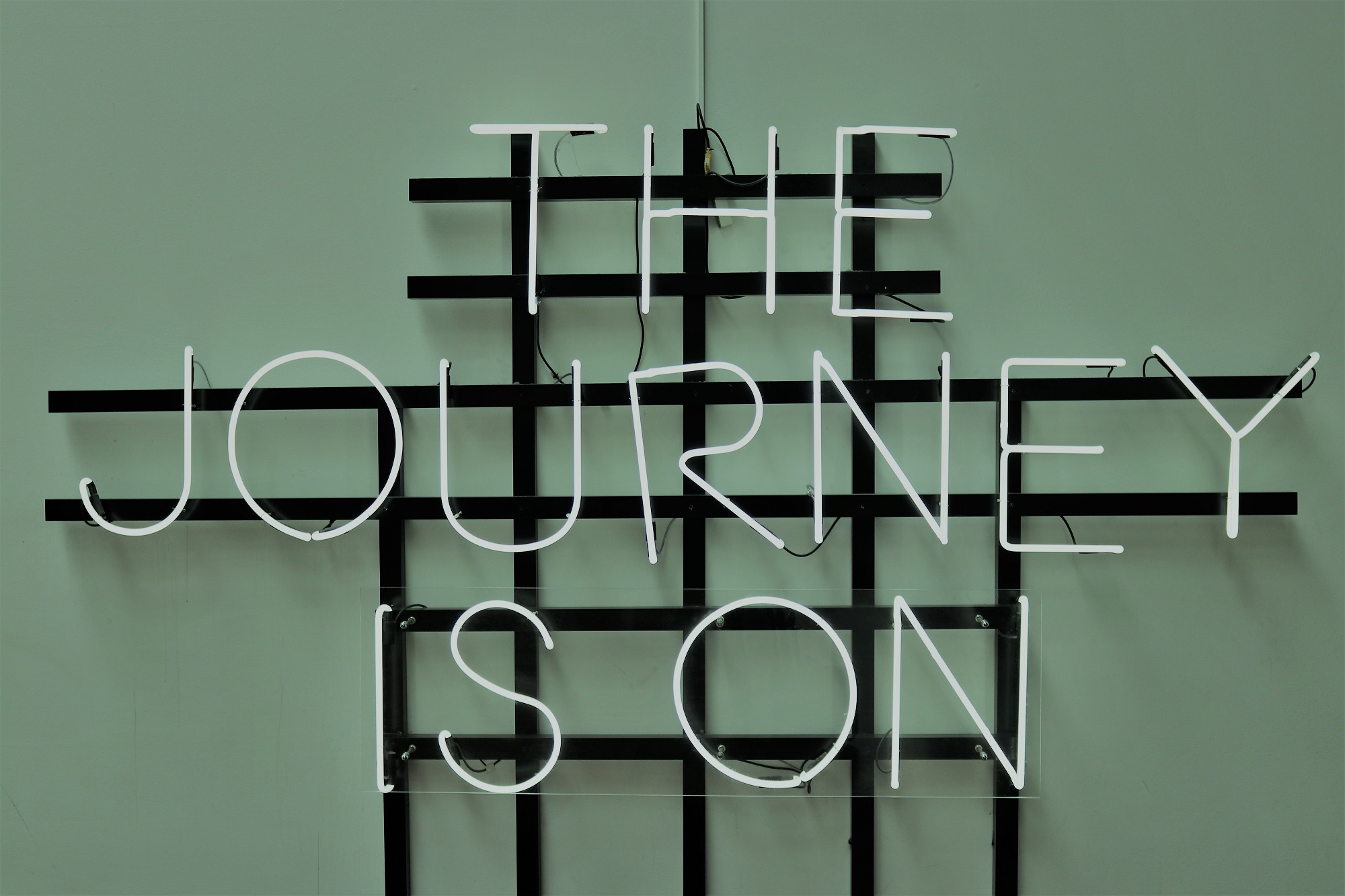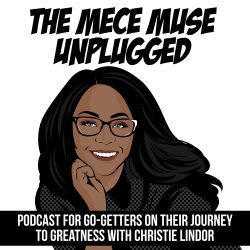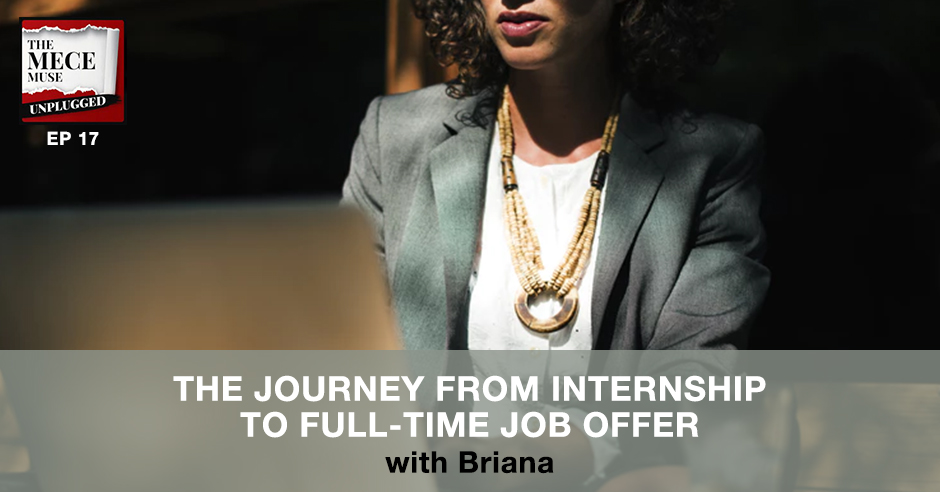Crossroads interview (the Intern edition) with Briana, a senior at Seton Hall University who recently completed 2 years of internships that ultimately resulted in her obtaining a full time consulting job offer this summer. In this second episode of our Welcome Back to Campus series, Briana shares her journey as well as techniques she used to successfully be invited to intern two years in a row at one of the world’s top firms and then ultimately landed a full time job offer.
In today’s career dilemma, Briana and I also give career advice to an intern that doesn’t receive a full-time job offer at the end of a summer internship. I provide additional thoughts to consider at the end of the episode in a quick MECE Mentoring Moment on how to land and maximize a consulting internship experience.
Listen to the Episode Here:
Podcast: Play in new window | Download | Embed
Subscribe: Apple Podcasts | Email | TuneIn | RSS | More
This is episode seventeen, our second edition of the Welcome Back to Campus series. Super excited to have a conversation about internships to offer. For what we’re going to do, we’re going to kick off the episode with a crossroads interview. For those that are new to the show, crossroads are when we have an opportunity to connect with a person that’s going in or out of consulting, and we talk a little bit about their journey and where they’re headed. We had a chance to connect with Briana. She’s currently finishing up her last year at Seton Hall University. She did a two-year internship that ultimately landed to her getting a full time offer, which is awesome. On crossroads, she’s going to talk about her journey and some of the tips and techniques that she used to first secure the internship, be invited back for a second year, that which ultimately led to her offer.
We’ll get a chance to connect with Briana. We’ll also have an opportunity in career dilemma. I had a chance to talk with an intern that did not get an offer extended. We want to give a little bit of guidance, so Briana and I are going to talk a little bit about what that person should consider moving forward. Lastly, we’re also going to do a MECE Mentoring Moment. I want to give some round out, some additional thoughts based on the conversation that Briana and I have and give you ideas and tips on what you should consider not only to secure an internship, but also what are really the things that matter in an internship. Sometimes there’s different perceptions out there. I want to talk a little bit about that and really figure out how to prepare for internships. With that, let’s get started.
Interview with Briana
Thank you, Briana, for taking the time to join us. How are you doing?
Doing good. I’m so excited. This is my first podcast ever, so I was a little bit nervous at first, but definitely excited to be giving some advice and sharing my story.
If you’re being interviewed for our podcast, you’re a go-getter, so nothing to be nervous about. Before we get started with interview, if you want to take a moment to introduce yourself to the go-getters of The MECE Muse Unplugged.
I’m going into my senior year, attending Seton Hall University. I’m majoring in accounting and information systems. I’m also doing a dual degree, so I’ll be getting a master’s in professional accounting. I interned last summer at one of the Big Four and I was fortunate enough to be offered another internship this past summer, and then at the end of that summer I was lucky enough to get a full time offer, so I’m super excited to start that at the end of college, and good to have something secured in. That’s a little bit about my work experience. I had two summer internships pretty much, and basically finishing my last year of school.
Congratulations on getting your offer. How did you feel the moment that you got it? Did they give you hints that you were going to get the offer, or did they leave in you in the dark? Give us a little bit of when you first found out.
They give you a hint. Your team would hint here and there like, “Next summer,” or, “When you’re here again next summer,” or things like that, but you never really know. I’ve heard people had amazing feedback throughout their internships and have not received offers because some places are so competitive. Even though I was getting that positive feedback, I wasn’t in of it, so when I got the offer, I was definitely jumping up and down, so excited because it’s so amazing to have something secured before you’re even done with school. That’s the scary part, not knowing what comes next.
I didn’t realize that you were in a dual program. You’re going to be finished, have you already finished up your undergrad? Is this going to be your master’s year? Can you tell us a little bit about the program you’re currently in?
Initially, I was going to do my four years undergrad and then the fifth year for my masters, but I remember last year, I spoke with my advisor and he said, “You can do it in four years. What would happen is your last year here, your first semester would be split between half undergrad classes, half graduate, and then your final semester would just be all graduate. You could do it that route, that would save you a little bit of money, a little bit of time, but you’re going to have to continue with the eighteen credits.” It’s definitely a sacrifice, but in the long run, it’s up to you if you want to go the route of getting it all done really fast or if you want to take your time. I know people who have done it in five years and the outcome is just as great. It’s just a matter of preference but doing it in four years for me was definitely what I want. I wanted to be out in the working world and getting my connections out there, so for me that’s what worked for me.

Can you share some couple of moments you had when you think about the internship experiences? How did you get started? What made you decide to apply for the internship programs? How did you find out about them? Maybe help some audience out there that maybe they’re in their junior year and are thinking about going down the path that you’ve already gone through. Maybe share a little bit about how you got started and what piqued your interest.
My sophomore year is when I heard about the first internship with one of the Big Four that I applied for. I was in the Career Center not even looking to finding internship. I was only a sophomore so I had the mindset where, “I’ll wait until junior year. It’s really no rush.” At the same time, I wasn’t aware that all the deadlines are usually in the fall, so I missed those deadlines. I was not even considering a summer internship. I remember I was in the Career Center one day and I’m working on my resume, and my career advisor says, “Have you applied anywhere?” I said, “No, I missed all the deadlines but I plan on working with summer and then I look for an internship next summer.”
He said, “We got an email from this company. They’re doing an internship. It’s targeted for sophomores, juniors, and up. Would you want to apply?” I said, “When is the deadline? ”She goes, “The deadline’s today.” I had nothing to lose, so I said, “All right.” Even though it’s a rush, you never know, so I applied. That’s how I got the internship. I think a month later I got the call, I went in for the interview, and then they called me the next day and they said, “We’d like to offer you the internship.”Definitely it was a spur of the moment kind of thing. They always say, “When you’re not looking for something, it falls in your lap.” That was the case for me, but I’m definitely so grateful that I did apply that day, because I was offered an internship for the next summer. I fell in love with the people there, the culture, and now I’ll be working there full time the coming year or so.
It honestly sounds like it was truly meant to be. It’s so funny how when something is truly meant to be yours, how easy things fall into place, whether you realize it or not. That’s just life, it feels like. For me, when there’s certain things that I’m trying to do and they’re just so hard, and then the things that I don’t want like, “It’s okay,” and then it’s so easy. When you talked about doing the internship and you went in for an interview, tell us a little bit about the interview process. What type of interviews did you have? Share a little bit about your recruitment experience.
When I went for my interview for the internship two summers ago, it was relatively the same as the one I went for last summer. A little bit more informal, so I wasn’t expecting it. It was a pleasant surprise because I was expecting a panel, and those kinds of questions back and forth, but it was more informal. It was one-on-one. I went through three rounds, two being in the office and then one being a lunch interview in that sense, just getting to know who I was, how I was in school, things like that.
The in-office interviews were just as easy going as the lunch, I’d say. They threw in some behavioral questions here and there, but it was more of getting to know me and my personality, just to see if I’m a good fit for the company, if I sit in with the culture. That just comes more with the position you’re applying for. I was applying for an internship, so the questions will vary more than if you’re applying for a specific job. Definitely just an easy-going interview, asking me about school, how do I balance school and work, things like that.
What advice would you give to someone that maybe preparing to go into some type of internship interview? What advice would you give them in hindsight?
Don’t try to find questions and memorize the answers. I was lucky enough to have a course for business writing where one of the things was we did a mock interview, and that kind of set me up for that where the whole strategy was to know a bunch of questions and have a key topic in mind where you can tell a story in a sense, but definitely not to memorize anything. A lot of things is behavioral questions, so “Tell us about a time when you were faced with the challenge.” You have a few pointers in your head about maybe two different types of stories that you could possibly come up with, but definitely not to memorize and not be nervous. My first time around, I was so nervous. It was a major company and so I was psyching myself out a little bit, but once I met the first interviewer, you realize they’re just trying to get to know who you are, more of a conversation than anything. That’s how you ease your nerves in line. Definitely don’t memorize.
I hear sometimes, especially college students, they get nervous because they don’t have a lot of experience to put on their resume. What were some things you may be used to create your resume, when this is the first time getting into a major corporation?
The good thing about that is, when you’re starting younger and in college, no one really expects you to have any crazy experience. What I was told, and I think it works for me, was any job you have, even if you worked at a summer camp like, “How does that translate to someone entering an accounting firm?” Everything translates in terms of the skills that you learn there. It’s like wording things in your resume to transfer those skills in a way that you could use them in a more professional setting. For me, I did a lot of retail work, and so just wording things, censoring merchandise to reduce shrinkage, those little wordings are what make the real difference so that they see that you’re working for a purpose.
You’re not just listening like, “I cleaned the bathroom.” It’s all about the wording. For me, I was co-directing a youth group at my church, and I didn’t think that was relevant to put on my resume, but they asked me about that in my interview and it’s just a talking point. It also brings out little things like how you show leadership and you’re contributing to something that you’re not getting paid for, so they see you’re charitable, you want to do things to help. You’re not just someone that is all about the grade, so showing that you have dimensions, see who you are.
Once you got your internship in the bag, your two years in now, you’ve done a couple of years, maybe share some moments with us. I’d love to hear a defining moment in your internship where it was a big a-ha moment when you learned something that you realized was going to be important for your career. Then on the flip side, if you can also maybe share what was a challenging moment that you weren’t expecting and how you overcame them?
The defining moment was the day my team that I was working with actually allowed me to sit in on a client meeting, as an intern. I mean you take what you can get, especially during the summer. I’d say it’s not as busy, so the staff alone don’t have too much work, but you take what you can get. The day that they asked me to sit on a client meeting, I was in shock. I remember I was in the office, so I had to travel out there, but it was something that I was so excited to do, and I learned so much just by sitting in.
You are not talking and contributing in that way, but you’re sitting in and you’re absorbing the information and you get to see how is that this company interacts with the client. What are the things that are discussed in these meetings? How is it that you’re supposed to compose yourself around the client? Just hearing discussions about what the client does, it helps you to gain a better understanding in that sense. Even though it was two meetings that I sat in, I learned so much in that, and how is it that these things even take place. It’s all about the communication between the company and the client.
Then for a challenging moment, I’d say it was definitely the first few weeks adjusting back from classroom setting to a working world. The hardest thing at first was getting to understand what the client did and their structure in terms of their controls, and their processes. Transitioning from more of a black and white kind of thing, where you know you’re in school, you know the material you have to study, you take the test, then that’s that. In the real world, it’s not like that. You have to think critically and think outside the box. I remember one of the first things that they assigned me was performing walkthroughs.
That involves picking a sample, looking at the controls for that sample, and piecing together support that the client sends out. I was lost at first, and I was scared to ask questions because I didn’t want to seem like I didn’t know what I was doing. At the same time, the important thing there is to realize they don’t expect you to know anything, so for me, I had to figure out that it’s okay to ask questions. From there, when I’m asking these questions, “How do I translate that? think outside the box for myself, and figure this out on my own.” That was definitely the toughest part at first.
I want to talk to you about the intern dilemma that I have been shared with. What tips or advice would you give other college students that are looking to not only gain internship experience but hoping to really convert that into an offer? What advice would you give them?
I know it sounds a little bit cliché because I’ve heard this so much, but definitely just being open is the biggest thing out there. It’s such a general thing to say but being open not only does it open so many doors for new experiences. At this age, we’re like sponges. We’re absorbing everything. Being closed minded and turning things down just because you think you may know how it’s going to be, that you don’t really know, that’s not the way to go. Being open and jumping at anything you can get.
Being positive no matter what you have going on at home, or at school, when you’re there to work, just be positive, especially at this age when we’re just starting out. They’re not going to want to work with someone who’s negative. It’s understandable that you’re going to have some off days, but overall, having a smile on your face because you want to be approachable that way you get to work, you get things, you get new tasks to do, and then that’s how you learn more. The cycle continues, and so definitely being open and being positive.
There’s a conversation I was having with somebody where they were really bummed out. This individual, she didn’t get an offer, but she did a couple years internship as well. She did not get an offer, and she was pretty bummed about that. I had some words of encouragement for her, things to consider. Given where you are now, I know you talked about being open, being a sponge and being positive. For someone who’s sitting on the other side of the fence, what type of advice would you give them, knowing what you know?
I would definitely say, “Don’t give up.” Life is funny in itself in that what’s meant to be is meant to be. Maybe that job wasn’t the right job for this particular person. Definitely keep looking, don’t give up, use the free time wisely, whether it’s looking for a different internship or setting for an exam that you have for certification. Even going out there and getting a certificate in something, things to help boost you up, that way it’s even harder for people to turn you down. I know a friend of mine, who interned for this amazing company in the financial industry.
She didn’t get the offer, but that’s not to say that she wasn’t qualified. It’s just to say it didn’t add up at a specific time in that person’s life. I definitely just say, “Don’t give up. Keep pushing through. What’s meant to be will be, and look for something else because there’s always something out there.” If you we’re given the opportunity for two different internships, you’re an amazing individual and you have that good working experience, so use that, push through and find something new.
That’s actually a little bit of the advice that I gave her as well. I talked to her and it’s along the lines that this could be a blessing in disguise. I had a colleague of mine that fell into consulting because he had an internship at another company and they had declined the offer. He ended up getting an offer. He was like, “The other role was going to be great, but this is actually even better.” It goes back to the point that you just started. It could be a blessing in disguise for sure. For any of my go-getters, you just finished an internship, didn’t get the offer, I like to focus on what I do have. You can take a step back and there’s something you can add to your resume. You’ve got this amazing experience. Make sure to stay connected with those people. Be really grateful because there’s nothing like experience in this world.

Experience, to me, is your currency to anything you want to do. Experience and relationships. The fact that you have an opportunity to grow both is an amazing opportunity. To consider that you’re walking away, you’re adding something really substantial. Make sure you stay connected with those people whether they’re through LinkedIn, let them know what’s happening. Things change, the tide changes a lot. Even people that didn’t get an offer, you never know six months along the line you may end up reapplying or they may reach back out if you stay connected. Be positive and be open. You never know what’s coming around the bend. Stick it out, you’ll be fine. Think about the amazing experiences you did have and the connections you made. That, in itself, is priceless. Briana, if you’ve got anything else you want to add to that?
At this age, you call them go-getters, that’s what everyone at this stage in their life should be, trying to push forward, find any opportunity out there that’s going to help them as an individual. I know that’s like what I did. I was fortunate enough. I applied at the last minute and I fell in love with the company. For some people that’s not how it turns out, but we’re young. We get to move around and that’s the beauty of life.
I got my first consulting career role in September. I started the school year in October. I got my job offer and I was graduating in May. I have super major, senior-itis. I would say in hindsight maybe I could have used that time a little better, because I think I was just so excited, I got my offer, I was just like, “Whatever.” I think it’s a good time to really get ready. It means for your family, in terms of wrapping up certain things, whether it’s academic or whatever that means for you. I would say use the time wisely.
I personally stepped out of senior-itis two weeks before I graduated. I was like, “I got to get it together. I have to be an adult now.”I would say definitely use the time and really continue to prepare. Even the person that didn’t get the offer, just like you, you got your offer, but stay connected with everyone you’ve met and over the next year and you’ll walk in with a ready-made network and brand. I wish you the best, Briana, I think you’re going to do great things.
Hope you enjoy the conversation I had with Briana. This is going to be a quick MECE Mentoring Moment. I want to round out some thoughts on one, how to start to prepare for internships, and now is the time. This is the perfect time, if you’re thinking about interning at a consulting firm, want to talk about how to prepare, how to land a role. Two, I also want to talk about what are some things to do once you have arrived at a firm and makes the best of that internship, and how you can potentially turn an internship to an offer in the future. Start with how to find internships. The easy answer is to leverage your career center. Now’s a really great time to start to update your resume, making sure that you have a great cover letter.
Don’t neglect any experiences that you have on campus and leadership positions, if you’ve done volunteer work. Sometimes, I’ve heard from folks in college, they feel like they don’t have enough on their resume. I think that’s fine. Firms know that you were just starting out in your career and they know that you’re in school, so I don’t think firms are really seeking for you to have a lot of work experience, but you should have some sort of experience to really demonstrate your ability to think strategically, that really demonstrate your leadership position, to demonstrate your motivation and your drive and perseverance. Think about what are some situations where you have that and round that out in your cover letter and your resume. Connect with your career center, find out what opportunities that they may be privy to. Firms are typically starting to do their recruiting now. This is actually the season for it. Definitely check out what you can find in your career center.
On another note, if you’re part of any student union, or any type of student organization, connect with them as well. You’d be very surprised how if you’re connected in a specific Greek organization, if you’re connected to any type of chronic professional association that may have a student chapter, those are definite opportunities and outlets for you to figure out how to land one, and your own connection. Look at your classmates, your own peer, talk to people that you may know, check out who you may be connected to on LinkedIn or Facebook that may have an into these organizations. It’s doing a little bit of research, figuring out who you’re connected to.
Don’t be afraid to reach out and do informational interviews. That means you connect with someone that may work at a firm that you’re interested in on LinkedIn and especially if you’re in college. Firms and especially seasoned consultants, they love speaking to college students, and so definitely reach out to folks you know that you may have a second-degree connection to, that can give you a little bit more insights about their particular firm. You want to try and exhaust different options when it comes to landing a specific type of role.
Another thing I want you to think about is if you’re not able, for whatever reason until a specific consulting role at a consulting firm, don’t underestimate the fact that organizations, any type of organization out there. They sometimes have rotational programs, and they have an internal consulting function, and or you may be able to land a finance internship or a marketing internship. Don’t underestimate those experiences as well, and try again in the future for whatever reason you’re not able to land it, because as a consultant, it’s always great to have industry experience.
If you could do internships, you can always use that as leverage for future opportunity. You want to start to position yourself now and go-getters that are in their freshmen or sophomore year, it’s never too early to begin to round that out. It’s maybe too early for you to start to think about that, but you want to start as soon as possible, I’d say, “That’s one thing around preparing and landing an internship. I want to quickly talk about how to make the best of an internship.” I’d say most of the larger firms, they have a really rigorous internship program, because that’s their weights and vet their future talent. Chances are if you go to one of the bigger firms, you may be able to have an opportunity to get exposure to client work, to help seasoned consulting teams solve cases, or help them round out or implement a project, which is fantastic experience.
Consulting internships are about experience and connections. If you’re on an internship, your primary objective is to connect. You want to make a first impression a lasting impression that you have potential to perform. It’s really about the connections you make and the connections you take back with you, and sustaining those connections throughout the year. The internships sometimes are hit or miss. Sometimes you land an amazing line and you get really great experience and you work with individuals that know how to leverage an intern, and then sometimes, not so much. Sometimes people don’t know how to work with interns and that’s okay. It’s making the best of what you have.

I’ve heard interns complain sometimes about feeling they didn’t do enough, or they were expecting a lot more than they did, or they were doing more admin work. Whatever you’re given, make the most of it. You want to make sure you walk away with some good opportunities and networking with various different leaders, various different people that are in the executive. There’s two sets. There’s the executive layer, which in most firms is like your managers, senior managers or project leaders. It depends on the firm, there’s different titles but kind of that layer. Then you have your senior executive layer, which is your managing directors, your partners, your principles, et cetera. You want to make sure that you’re making connections with those individuals where you can, because you can consider building that, continuing to build that and foster that relationship for future opportunities.
Connecting with your people that are above you so you know the consultant levels, the staff levels, analyst levels or senior consultants, so you want to make sure that you connect with them as well, because they have their ears to the ground and they can really help you and give you some additional insights that sometimes the executive or senior executive layers they may be far removed from. Don’t lose sight of that. One of my pet peeves personally is when I get a chance to connect with an intern. They may have been really impressive for that summer, and then I never hear from them again, up until maybe they get another internship sometimes. Sometimes they don’t, or they get an offer and then I run into them on an elevator.
Those are missed opportunities because I’ve actually seen this. I actually seen a couple of people and I really wish I heard from them. I didn’t know what happened to them, and I actually had projects, I know people who are looking for their skill sets, and it’s like it was missed opportunities. You want to make sure you make impressions, you make connections with people, you really sustain those. You take those with you because that’s really the point. The point is to make those connections, to learn about the firm and learn about the culture, and figure out if this is something you want to do moving forward. That wraps up our MECE Mentoring Moment and wraps up our episode. I want to thank Briana, for her time, had a really great conversation with her. Thank you my go-getters for tuning in.


